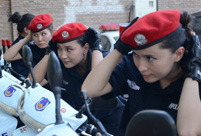 The 4th Chinese National Pole Dance Championship held in Tianjin
The 4th Chinese National Pole Dance Championship held in Tianjin
 Chinese navy commandos debut at 2014 RIMPAC
Chinese navy commandos debut at 2014 RIMPAC
 Guangxi impression: scenic countryside
Guangxi impression: scenic countryside
 World's largest aquatic insect found in Sichuan
World's largest aquatic insect found in Sichuan
 Ceremony volunteers for Youth Olympics make public appearance
Ceremony volunteers for Youth Olympics make public appearance
 A glimpse of female crew of Liaoning aircraft carrier
A glimpse of female crew of Liaoning aircraft carrier
 Stills from "Dad, where are we going?"
Stills from "Dad, where are we going?"
 Legless man's happy life
Legless man's happy life
 Top ten most beautiful islands in China
Top ten most beautiful islands in China
 Aerial view of Hong Kong
Aerial view of Hong Kong
CHANGE ON THE ISLANDS
Only those who lived on the island can see the changes that have taken place. According to Sui Zhendou, 73, in the 1960s, there were about 300 residents on Liugong. There was no electricity cable connected to the mainland, so power was supplied by the navy.
"We were woken up by reveille every morning, and every evening the power went off at 9 p.m., so we went to bed then," he recalled.
Beiyang military academy became part of the compound, but troops left in the early 1980s, and the school buildings became home to the villagers' chickens and goats. Drinking water and vegetables were shipped to the island from Weihai city from time to time, and stored in the tunnels and ammunition dump of the 120-year-old emplacement.
The tranquility was broken in 1985, when the Jiawu War Museum opened to public in the renovated buildings. Visitors flooded the island, but the adjacent Ri Island remains desolate with no permanent residents. Only five fishermen live there, breeding sea cucumbers.
LESSONS FROM HISTORY
Once the most powerful in Asia, with battleships and cruisers brought form Europe and sailors trained there, the Beiyang Fleet was born in Weihai, where it came to an end.
The year 2014 is another jiawu year and for two sexagenary cycles the cause of the failure has been under discussion.
In Hefei, about 1,000 kilometers from Weihai, the former residence of Li Hongzhang received as many as 300,000 visitors last year. Li, for decades denounced as a traitor, founded the Beiyang Fleet and was the representative of Qing government who signed the Shimonoseki Treaty.
Curator Wu Sheng says visitors protested when the residence opened to public in 1999, but Li has since been rehabilitated.
"The defeat boils down to the corruption and incompetence of the Qing administration," Wu said. "Li is just a rubber stamp, a scapegoat."
At the end of the naval exhibition hall in Wehai is a replica of the "steering wheel table". The original is in Japan. After capturing the battleship Dingyuan, the Japanese made a table from its helm to mark their victory. A sword hangs above the replica against the backdrop of a big red character: SHAME.
"It reminds us of the ignominious past, and urges us to move forward," said a naval officer. "The Japanese studied China for 30 years before firing a shot, but the Qing government ignored the outside world; a bitter lesson to learn."
"The Jiawu War left a scar in the hearts of every Chinese citizen, especially soldiers," said Liu Wei, a marine police officer. "At present, we are still behind developed countries in terms of military equipment. We need to improve."
Ding Xiaoming and Ding Xiaolong are descendants of Ding Ruchang. They go to Weihai every summer, selling history books.
"I haven't had much education, but I am proud of my ancestor," said Xiaoming, 52. "I don't want to use his name to make money. I sell the books to let more people know about the Jiawu War, a national shame that should never be forgotten."
 |
 Zhujiang ambassadors attend lotus lanterns activity
Zhujiang ambassadors attend lotus lanterns activity
 From girly girl to tough special police officer
From girly girl to tough special police officer
 Children attend gymnastics training in summer
Children attend gymnastics training in summer
 Beautiful sceneries along the special travel route in Xinjiang
Beautiful sceneries along the special travel route in Xinjiang
 Focus on 1st female patrol team in Turpan
Focus on 1st female patrol team in Turpan
 Collection of 'China Dream' public-spirited ads
Collection of 'China Dream' public-spirited ads  National fitness team members integrate traditional and modern beauty
National fitness team members integrate traditional and modern beauty Moms on their kid’s coming out
Moms on their kid’s coming out Chinese fighters through lens
Chinese fighters through lens
 48 hours after super Typhoon Rammasun
48 hours after super Typhoon Rammasun Bikini show held at water park in Xi'an
Bikini show held at water park in Xi'an
 Lobster vs cat: catch me if you can
Lobster vs cat: catch me if you can  Heat waves sweep China
Heat waves sweep China  Top 10 most beautiful islands in China
Top 10 most beautiful islands in China
 Zhou Xun announces engagement to Archie Gao
Zhou Xun announces engagement to Archie Gao
Day|Week|Month